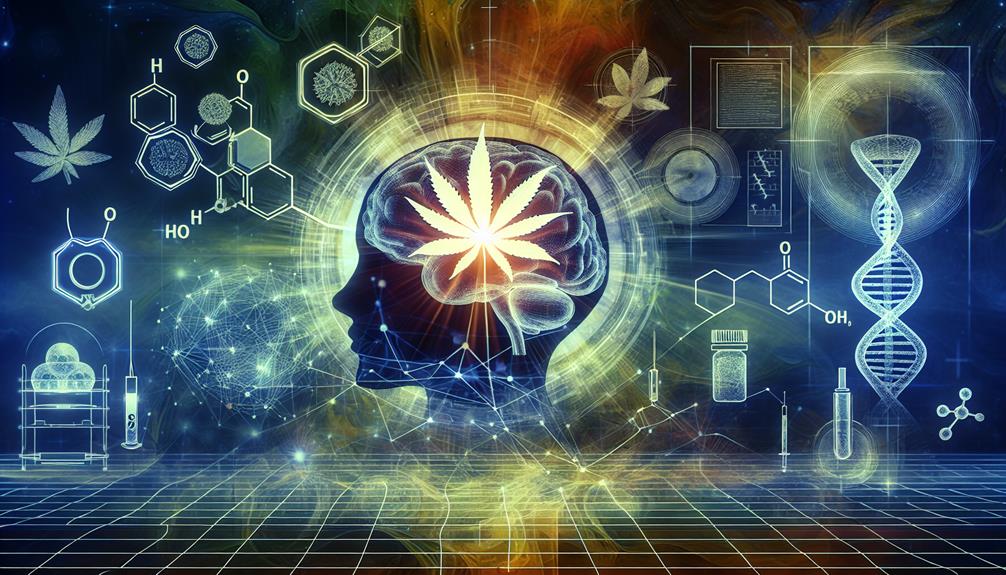Have you ever wondered how a compound from the cannabis plant could potentially alter the landscape of mental health treatment? You're not alone. As you've probably heard, Cannabidiol, or CBD as it's more commonly known, has been the subject of intense interest in the scientific community. You might be aware that it's touted for its lack of psychoactive properties and its potential benefits for anxiety and depression, but what's the real story? The current evidence suggests that CBD could interact with the complex neurochemistry of the brain, potentially offering a natural alternative or complement to traditional pharmaceuticals. However, with the myriad of products flooding the market and the regulatory landscape still taking shape, you're right to approach this topic with a healthy dose of skepticism. As we peel back the layers of scientific jargon and marketing hype, you'll find a nuanced picture emerging—one that could change the way you think about mental wellness. Keep an open mind as we explore the potential implications and the critical questions that remain unanswered.
Understanding CBD
Derived from hemp plants, CBD has emerged as a promising compound in the treatment of various medical and psychiatric conditions, including mental health disorders. You'll find CBD at convenience stores across the US, with sales hitting a staggering $2 billion in 2018. Its therapeutic potential is linked to its interaction with the central nervous system, primarily binding to CB2 receptors on immune system cells, with 7-hydroxy-CBD being its main active metabolite.
When exploring the effects of CBD on mental health and wellbeing, it's crucial to understand its role in the treatment of mental disorders such as anxiety, depression, PTSD, and opioid use disorder. Clinical studies have shown that CBD may alleviate symptoms of these psychiatric disorders, offering a glimmer of hope for those seeking alternative treatments. Its FDA approval for childhood epilepsy underpins its recognized medicinal value.
However, to fully endorse CBD's role in mental health care, further longitudinal studies are essential. Such research will validate the efficacy of CBD and potentially unlock new avenues for treating complex psychiatric conditions. As you consider CBD for mental health, bear in mind that evidence-based clinical guidance is pivotal for safe and effective treatment outcomes.
Anxiety and CBD
Amidst growing interest in alternative treatments, CBD has demonstrated significant promise in attenuating symptoms of anxiety across various conditions. Research points to its potential anxiolytic effects, especially pertinent to social anxiety disorder and other anxiety-related disorders such as generalized anxiety disorder, OCD, panic disorder, and PTSD. You'll find that studies, including those by Crippa et al, have highlighted the efficacious use of CBD in the treatment of mental health conditions.
One pivotal study involved administering a single dose of CBD to individuals with social anxiety disorder, resulting in a notable decrease in anxiety levels. This finding is bolstered by a systematic review and meta-analysis that consolidates data from multiple studies, underscoring the therapeutic potential of CBD for anxiety. It's critical to understand that while the evidence leans favorably towards the use of CBD, the research landscape is still evolving.
Given the reported side effects are relatively minimal compared to traditional anxiolytics, CBD's safety profile is particularly appealing. However, it's essential to proceed with caution. Further investigation is needed to fully ascertain the long-term implications of CBD's use and to establish standardized dosing guidelines. As you consider CBD's role in the treatment of anxiety, it's important to keep informed on the latest clinical findings.
CBD's Antidepressant Effects

You may find it interesting that studies suggest CBD could have a role in elevating mood by interacting with the body's endocannabinoid system. This interaction potentially restores neurochemical balance, which is often disrupted in depression. It's crucial to analyze the clinical evidence that supports these antidepressant effects of CBD, ensuring a clear understanding of its therapeutic potential.
CBD Elevates Mood
Research indicates that CBD may enhance mood by interacting with serotonin receptors, potentially offering antidepressant benefits. In the realm of mental health, the effects of CBD have been closely studied. Here's what you should know:
- CBD may positively impact patients struggling with anxiety disorders and depressive symptoms.
- By influencing serotonin receptors, CBD shows promise as a therapeutic agent with antidepressant effects.
- Improved sleep quality has been reported, which is crucial for overall mental health and mood stabilization.
- Studies highlight CBD's potential for an improvement in psychotic symptoms compared to traditional treatments.
- CBD's therapeutic benefits may extend to a general elevation of mood, aiding those in need of mood regulation.
As research progresses, the clinical understanding of CBD and its role in mental health continues to evolve.
Neurochemical Balance Restoration
CBD's antidepressant effects appear to stem from its ability to restore neurochemical balance, particularly by modulating serotonin receptors that influence mood and anxiety. In psychiatric disorders, including anxiety conditions, therapeutic effects of CBD may be partially attributed to its action on brain areas like the prefrontal and cingulate cortex. These regions are critical for emotion regulation and cognitive functions, which are often disrupted in depression.
Although CBD has shown promise in alleviating cognitive impairment and in the normalization of serum levels of neurochemicals, it's important to proceed with caution. Despite its potential, there have been reports of major toxic effects associated with CBD use. Therefore, while CBD could play a role in neurochemical balance restoration, its safety profile must be thoroughly understood and monitored.
CBD for PTSD Relief
Preliminary studies indicate that CBD may offer significant relief for individuals experiencing PTSD by mitigating anxiety and stress symptoms. As you explore the potential therapeutic effects of CBD for PTSD relief, it's essential to consider the clinical evidence.
Here are key points from recent research:
- CBD has been observed to reduce nightmares and recurring memories, common PTSD symptoms.
- The anxiolytic properties of CBD may help to lower heightened anxiety levels associated with PTSD.
- CBD's influence on the endocannabinoid system is thought to play a role in emotional regulation and fear response.
- Ongoing studies are investigating the efficacy of CBD in improving the overall quality of life for psychiatric patients.
- It's important for individuals to consult healthcare professionals before they use CBD as a treatment for PTSD.
While the body of evidence grows, the efficacy of CBD in treating post-traumatic stress disorder remains under investigation. However, early findings suggest that CBD could enhance the management of PTSD, potentially leading to improved outcomes for those affected. As with any treatment, rigorous studies are required to substantiate these findings and to understand the long-term health implications for individuals who use CBD for PTSD relief.
Sleep Disorders Management

Turning to the realm of sleep disorders, you may find that the potential benefits of CBD include the improvement of sleep quality, a crucial factor in managing these conditions. CBD has garnered attention for its therapeutic potential use in sleep disorders management. Clinical evidence suggests that the calming effect of CBD may alleviate symptoms associated with sleep disturbances.
Research indicates that patients using CBD oil, particularly through oral administration, report better sleep. This improvement is thought to stem from CBD's interaction with the body's endocannabinoid system, which plays a role in regulating various physiological processes, including sleep.
While studies highlight the promise of CBD, it is essential to consider the optimal dosages that might benefit sleep quality. High doses of CBD have been associated with sedative effects, which could be advantageous for patients with disorders that hinder sleep. However, the effectiveness and safety of long-term use of CBD for sleep require further investigation.
As you explore CBD's role in managing sleep issues, it's important to remember that while CBD may hold potential, it's not a one-size-fits-all solution. Consulting healthcare professionals and considering current research are critical steps in discerning whether CBD could be an appropriate addition to your sleep disorders management regimen.
Potential Risks and Considerations
Despite its therapeutic potential, you should be aware that CBD may come with risks such as mood alterations, anxiety, and impaired cognitive function. While it's often touted for its lack of psychoactivity compared to its counterpart, THC, the effects of CBD are not entirely benign. You must consider the evidence which suggests that CBD can have an array of psychiatric symptoms, particularly in sensitive individuals or when taken in large doses.
Here are key considerations regarding the risks associated with CBD use:
- Psychotic symptoms in patients: CBD may exacerbate psychotic symptoms, particularly in patients with schizophrenia or a predisposition to psychosis.
- Increased risk for substance use disorders: Regular cannabis use, including the use of medical cannabis, can lead to substance use disorders.
- Effects of THC: Some CBD products may contain higher levels of THC than advertised, potentially leading to the negative effects of cannabis use.
- Negative symptoms: High doses of CBD could potentially worsen negative symptoms in certain mental health conditions.
- Interactions with other medications: CBD can interact with other medications, potentially altering their effects or leading to adverse reactions.
It's crucial to approach the use of CBD with caution, especially if you're considering it for managing mental health issues. Always consult with a healthcare provider before starting CBD, particularly if you have a history of mental health disorders.
Future Research Directions

As you consider the trajectory of CBD research, it's crucial to focus on elucidating the neurological pathways influenced by CBD to better understand its effects on mental health. You'll need to scrutinize the methodologies employed in clinical trials to ensure robust and reproducible outcomes. It's also essential to integrate findings into existing psychiatric practices to optimize patient care.
Exploring Neurological Pathways
To fully comprehend CBD's potential in mental health treatment, researchers must delve into its effects on the endocannabinoid system, particularly its influence on mood and emotional regulation. Here are pivotal areas for future investigation:
- The role of CBD in modulating endocannabinoid system dysregulation, especially in psychiatric conditions like major depressive disorder.
- CBD's effect on serum endocannabinoid levels and its mood-stabilizing properties in bipolar disorder.
- Evaluation of CBD's anxiolytic and antipsychotic properties through rigorous clinical trials.
- Research into the psychoactive effects of CBD and their neurological pathways, focusing on anxiety disorders and PTSD.
- Studies on the therapeutic potential of cannabinoids in schizophrenia, including the relationship between endocannabinoid levels and psychotic symptoms.
Clinical Trial Methodologies
Building on our understanding of how CBD interacts with neurological pathways, it's critical to refine clinical trial methodologies to evaluate its efficacy and safety in mental health treatments. Future research should focus on randomized controlled and longitudinal studies to gather robust evidence supporting CBD's therapeutic efficacy. A study suggests that determining optimal dosing and delivery methods is imperative for different psychiatric conditions. Moreover, you'll see an emphasis on understanding how CBD interacts with other medications in patients treated for mental health disorders. Clinical trials may also explore CBD's use in combination therapy, potentially enhancing treatment efficacy while minimizing adverse effects. Pre-clinical studies have laid the groundwork, and now, precise clinical methodologies will clarify CBD's role in mental health management.
Frequently Asked Questions
Is CBD a Stimulant or Depressant?
CBD isn't strictly a stimulant or depressant; it's complex. Its properties modulate neurotransmitters in your brain, potentially easing anxiety and improving sleep. It might affect addiction potential by altering stress responses and emotional regulation. However, its cognitive effects require more scrutiny. Legally, it's widely accepted due to low psychoactivity. You should understand CBD's interaction with brain receptors for a complete picture of its influence on your system.
Does CBD Cause Mood Swings?
You're curious if CBD's a mood magician, but it's not all rainbows. CBD research is ongoing, yet it's not a one-size-fits-all for emotional stability. It might offer anxiety relief and aid in mood regulation, but effects vary. Some with bipolar disorder see benefits; others, not so much. Clinical trials are key to understanding its neurochemical effects. A psychiatric evaluation can guide depression treatment, considering the hormonal impact. Always consult a professional.
How Much CBD Should I Take for Mental Health?
To determine your CBD dosage for mental health, start with 10-20 mg and adjust as needed. Consider your weight and symptom severity. It's vital to find an optimal intake for anxiety relief and depression management, understanding CBD's therapeutic potential. Adhere to dosage guidelines and tailor daily regimens through dose titration. This personalized medicine approach ensures mental clarity. Consult a healthcare provider for advice tailored to your condition.
Does CBD Make You Feel Spacey?
CBD may make you feel spacey as it can alter brain chemistry, affecting alertness levels and mental clarity. This perception change isn't one of the common CBD myths; it's grounded in how CBD interacts with cognitive functions. Your daily dosage and substance interactions matter significantly. While some experience enhanced focus effects, others might notice a dip in their ability to concentrate, underscoring the importance of considering CBD's impact on driving safety.
